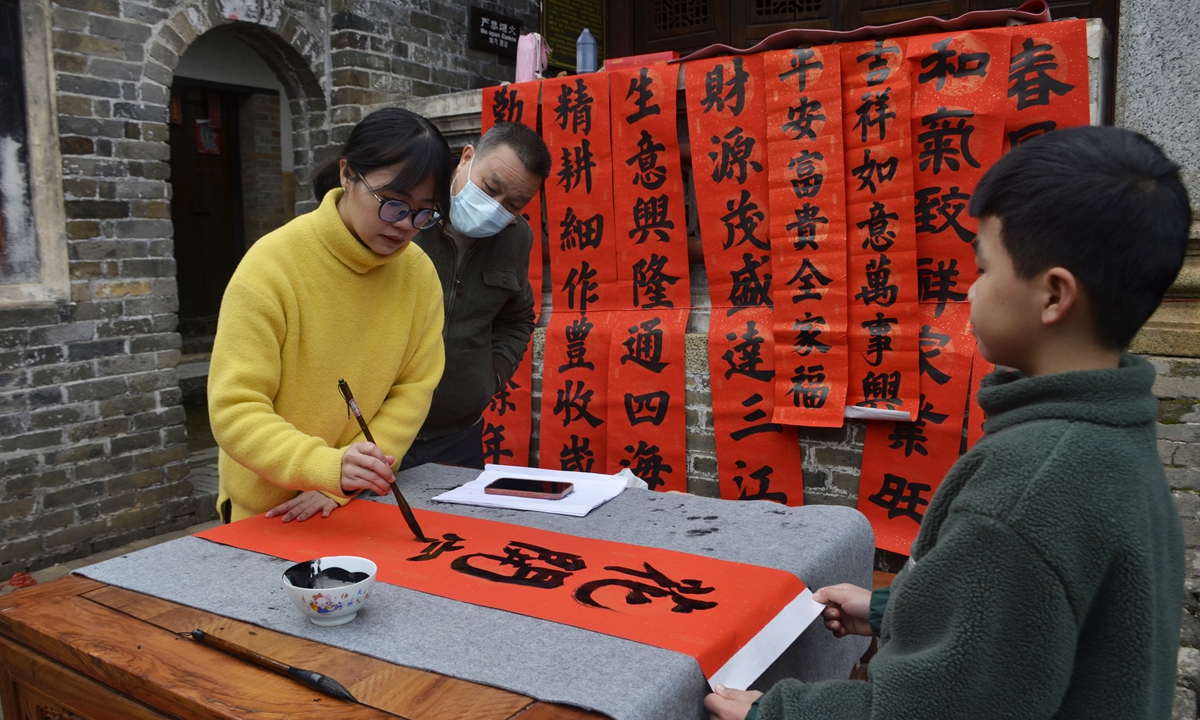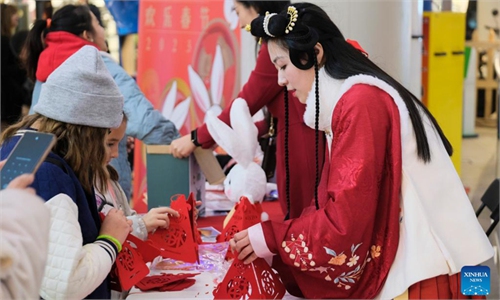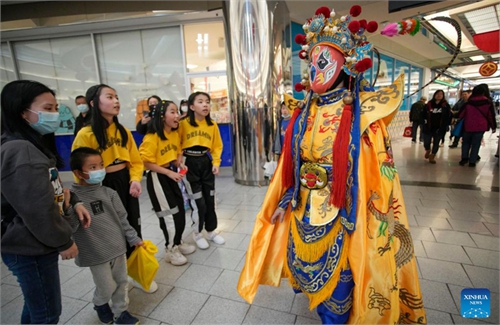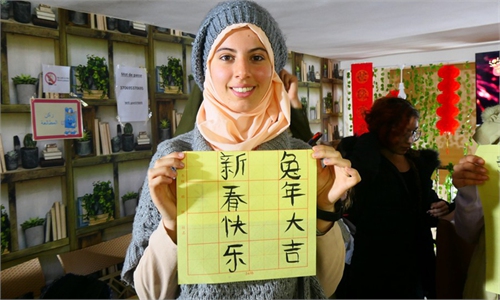ARTS / CULTURE & LEISURE
Diverse Spring Festival businesses show entrepreneurial spirit of young Chinese
Seize the (holi)day

A young lady writes Spring Festival couplets on January 16, 2023 in Qinzhou, Guangxi Zhuang Autonomous Region. Photo: VCG
From cooking tailored dinner banquets to selling customized Spring Festival drawings and couplets, many young Chinese created numerous innovative small businesses targeted the recent Spring Festival, which was blessed by China's all-round recovery from three years of hard fight against COVID-19.
These new emerged professions were not only the result of an overflow of demand following China's economic recovery, but also stem from young Chinese people's desire to live better lives through creativity.
Recovery creates opportunity
Although 26-year-old chef Su Yiling has always dreamed of being a private chef, the roughly 6,000 yuan ($888) he made in three days during the Spring Festival made him realize for the first time ever that "I could make a good living at this."
Su, who is an expert in making Japanese and Sichuan fusion dishes, cooked for six families in Southwest China's Sichuan Province over the three days that started on January 21, Chinese New Year's Eve.
Su told the Global Times that two of the families had booked him for Chinese New Year's Eve dinner and lunch a week before, while the other requests he got were scheduled at the last minute.
"She [a client] said restaurants were packed, but since she didn't want to have a casual meal during this big occasion, she offered to pay me an extra 200 yuan if I could cook for her and her family."
Things were not just busy in Sichuan. The combination of China's optimized COVID-19 measures and the holiday brought a volcano-like eruption to the catering and services industries, especially in tourism dependent cities like Chongqing and Sanya in Hainan Province. At another tourist hot spot, Changsha, the queue at local restaurant Wenhe You stretched to thousands of people a day.
Su told the Global Times that the packed restaurants created an opening for his niche dishes and that he has already started to schedule a menu for the May Day holidays.
"Yes! Of course," Su replied when asked if he thought private holiday bookings were sustainable over the long term.
"Three years ago it was only a fancy trend, but now it has become a lifestyle for many young people who are willing to explore a bit. When they are in charge of holiday feasts, this creates opportunities for me. It is all thanks to China's bounce-back."
Best wishes
Thanks to the Chinese tradition to greet a new year with best wishes, Yan Yingying, a 26-year-old illustrator, also made some money over the holiday by selling illustrated Chinese New Year pictures and couplets.
"I made enough to buy the makeup set I wanted," she told the Global Times.
Yan said that as this is the Year of the Rabbit, 90 percent of her customers naturally asked for a picture of a rabbit.
"I designed different rabbits, like one in a cheongsam, and added different elements according to customers' orders," Yan said.
Another enterprising young Chinese, Xu Ke, made some money off selling art by launching a "family oil painting" service.
Xu told the Global Times that he saw this festival oil painting service not as stepping stone to a career but rather as something that was "fun" for a time. That said, he noted it was still an enjoyable experience that provided inspiration for his artistic career.
"When I painted the pictures for them, I saw how family members were coming back home for the holiday. This touched me. I'm a sensitive artist and so felt inspired by my fellow Chinese people's love for family."
Chu Xin, a cultural sociologist, told the Global Times that these holiday jobs have emerged due as the "Spring Festival" is no longer just a "tradition" in Chinese people's thinking.
"Young people's creativity can make the Spring Festival culture more global and vibrant," Chu said.
Refusing to 'lie flat'
During the past three years, "lie flat" has become a hot web slang term, which represents the mind-set of lying down instead of being a productive member of society.
However, in reality, the Chinese young generation is full of expectations for their lives and work in the future.
On the second day after returning to Fuzhou in East China's Fujian Province for the holidays, photographer Liu Yinglu stood up, grabbed her camera and set out to take photos for her clients. The most orders she received during the Spring Festival were for family portraits.
"Generally speaking I charged 300 to 1000 yuan," the 28-year-old told the Global Times.
Hao Lan, a custom phone case maker from Zhengzhou, Central China's Henan Province, is another example of someone working hard for a brighter future.
The 27-year-old foreign trade clerk knows how important it is to grab the chance to sell her wares during the Spring Festival season.
Customized traditional Chinese calligraphy was a favorite among her clients.
"Custom miniature Spring Festival couplets saying 'good luck,' 'wish you prosperity and wealth' and such were a hit," Hao told the Global Times.
Chinese New Year manicures were also a hit. A manicurist in Beijing told the Global Times that the peak order period started almost two weeks before the Spring Festival.
Of course these jobs are no easy task.
"This kind of 'holiday economy' involves skill, experience, and physical strength. So this was truly hard-earned money for me and I believe for most of us," Liu said.



